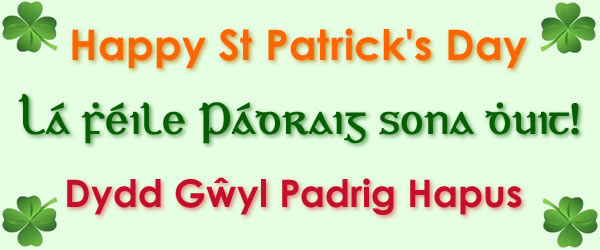
Here’s a recording in a mystery language.
Do you know or can you guess the language?
A Dutch I learnt recently is uitdaging [ˈœy̯tˌdaː.ɣɪŋ], which means a challenge. It comes from uitdagen (to challenge), from uit (out, off, over), and dagen (to dawn, light, rise, start, call).
Dagen comes from the Middle Dutch dāgen (to dawn, rest (a horse), delay, summon), from the Old Dutch *dagon, from the Proto-Germanic *dagāną [ˈdɑ.ɣɑː.nɑ̃] (to dawn, to become day) [source].
The Scots word daw [dɑ:] (to dawn) comes from the same Proto-Germanic root, via the Middle English dawen and the Old English dagian (to dawn), as does the obselete English word daw [dɔː], which means to dawn, wake up, daunt or terrify [source].
The word dawning, a poetic word for dawn or the first beginnings of something, comes from the same Proto-Germanic root, and from it we get the word dawn (to begin to brighten with daylight, to start to appear) [source].
The unrelated word daw is an old name for the jackdaw (Coloeus monedula), and also means idiot, simpleton or fool. It comes from the Middle English dawe, from the Old English dāwe, from the Proto-Germanic *dēhǭ (jackdaw), from the Proto-Indo-European *dʰākʷ- (jackdaw, starling, thrush) [source].
Daw is also found in Scots, and means a sluggard; a lazy, idle person; a slattern, a drab or an untidy woman, and comes from the jackdaw sense of daw [source].

Here’s a recording in a mystery language.
If you need a clue, have a listen to the Omniglot News, which is available on Radio Omniglot and Patreon.
The French word for daffodil is jonquille [ʒɔ̃.kij], which comes from the Spanish word junquillo (jonquil, rattan, strip of light wood, gold necklace), from junco [ˈxunko] (rush, reed, junk), from the Latin iuncus (rush, reed) [source].
The English word jonquil [ˈdʒɑŋkwəl/ˈdʒɒŋkwəl] refers to a fragrant bulb flower (Narcissus jonquilla), a species of daffodil, or a shade of yellow, and comes from the same Latin root, via French and Spanish [source].
The English word junk also comes from the same Latin root, via the Middle English junke (old cable, rope) and the Old French jonc (rush) [source].
In Danish and Norwegian a daffodil is a påskelilje, which means literally “Easter lily” [source]. In German they are called Osterglocke (“Easter bell”) or Narzisse (narcissus) [source].
By the way, I wrote a post about words for daffodil in English, Welsh and other Celtic languages a while ago.
According to a story on the BBC News, a performance of Shakespeare’s As You Like It wasn’t to the taste of one member of the audience at the Theatre Royal in York, who objected to Yorkshire accents being used, left during the performance and later asked for a refund.
The company responsible for the play, Northern Broadsides, said that its performances contained “unapologetic northern voices”, and the manager of the theatre apparently said “That’s Yorkshire accents, right here in Yorkshire”.
Here’s a trailer for the performance:
What is the world coming to when a theatregoer is subjected to northern accents in a Shakespeare play?
As everybody knows, Shakespeare should be performed with Received Pronounciation (RP), not with any other accent. After all, that’s how actors in Shakespeare’s time spoke, isn’t it?
Well no, English sounded it bit different back then, and many rhymes and puns in Shakespeare work in reconstructed Original Pronunciation (OP), but not in RP. Here’s an example of the differences between RP and OP:
The actor here is Ben Crystal, and his father, David Crystal, reconstructed the Original Pronunciation of Shakespeare, and is a honorary professor of linguistics at Bangor University, where I studied.
More about OP:

Here’s a recording in a mystery language.
Do you know or can you guess the language?
If you need clues, one is available on this week’s Omniglot Newscast, and another is available to my patrons on Patreon.
There’s an interesting idiom in Dutch – Nu komt de aap uit de mouw – which means ‘now the monkey comes out of the sleeve’ and is roughly the equivalent of the English idioms to let the cat out of the bag and to spill the beans. They mean to reveal a secret, or to reveal one’s true intentions.
Other versions of the Dutch idiom include:
The origins of the idiom to let the cat out of the bag are uncertain, although we do know it was first used in writing in The London Magazine in 1760 [source].
The origins of the idiom to spill the beans are also uncertain. It was first used in American in the early 20th century, so it’s unlikely to have come from the Ancient Greek practice of using coloured beans to vote, as many sources claim [source].
The Dutch idioms come from the practice of performers hiding an actual monkey up their sleeves which would appear unexpectedly at a certain moment. Alternatively they might refer to our inner ape/monkey or mischievous character which is usually hidden metaphorically up our sleeve [source].
Are there any similar idioms in other languages?
As today is St Patrick’s Day, I thought I’d look into the origins of the name Patrick.

Patrick comes from the Latin name Patricius, which comes from the word patricius (patrician, noble), from patrēs cōnscrīptī (Roman senators, or literally “enlisted fathers”) [source].
patrēs is the plural of pater (father, head of household, parent, forefather, priest), which comes from the Proto-Italic *patēr (father), from the Proto-Indo-European *ph₂tḗr (father), from *peh₂- (to protect, shepherd) and *-tḗr (agent suffix) [source].
Another word that comes from pater is patronus, which in the magical world of Harry Potter is a spirit guardian that can be summoned with the charm Expecto Patronum [source]. This is genunine Latin and means “I await my protector” [source].
cōnscrīptī is the plural of cōnscrīptus (senator, counsel(l)or; enrolled, enlisted, composed), which comes from conscrībō (I enroll, enlist, draw up, compose), from con- (with), and scrībō (I write) [source].
The English word conscript (One who is compulsorily enrolled, often into a military service) comes from the same Latin root [source].